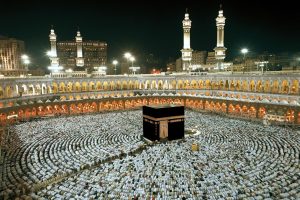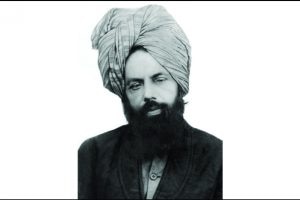“حَيَّ عَلَى الْفَلاح” “حَيَّ عَلَى الصَّلاة”
“O ye people, hasten to join the [congregational] prayer! Hasten because this is the real and complete success!”

© The Review of Religions
These are the exact words of the message contained in the Adhan, the formal call to congregational prayers in Islam. No other announcement or proclamation is extended to people globally, billions of times each day and at various times.
In Islam, there are five obligatory prayers to be offered daily by all Muslims, men and women. The congregational prayer is held in a mosque, and according to the teachings of Islam, the Adhan should be called before each prayer. The purpose of the Adhan, which literally means “pronouncement and declaration”, is evident from its meaning. It is to let Muslims living in that vicinity know that the time for prayer has arrived and that they should make due preparations.
The Adhan is to be called in a loud voice (which may occur via a public-address system nowadays) so that it is audible to the population living both near and far within the neighbourhood. As Muslims we respect the laws of the land and therefore the Adhan in Western countries generally is only called inside the mosque so as not to disturb the public or the neighbours. The Holy Prophet Muhammad, the Founder of Islamsa, is reported to have said that even a solitary person in the desert should make the formal call for prayer. Perhaps someone may upon hearing the Adhan, join the person in prayer. Even if no one appears through the call, that person would still profoundly be rewarded on the Day of Judgement that he did indeed pronounce the oneness and the greatness of Almighty Allah at that time.
Different methods are adopted by other religions to invite their followers to their place of worship. Some beat drums, others blow trumpets and some toll bells. Unless someone understands the meaning of these sounds, it is impossible for them to understand its significance. A bell is used in countless places such as schools and universities etc. How is the knell or toll of bells different from the ringing for mass? It is impossible to know the full message behind the invitation as such sounds are not self-explanatory. Without knowing the source of this invitation or the purpose for which one is being asked to attend, no one could be expected to make the necessary preparations for the occasion. One unaware of the significance of the call may enter the place of worship and offer the prayer lacking the full concentration and solemnity that it deserves.
Islam claims to be the perfect religion for mankind. It is unique in that it is the only religion which has used the human voice to call people to worship. The institution of Adhan can be cited as a clear example of the comprehensiveness of this perfect religion. The Adhan is a way to invite Muslims to their congregational prayers. The different phrases of the Adhan are not only meaningful, but also add to the purpose of the entire practice. Any person who hears a Muslim calling to prayers, can easily understand the meaning of the words irrespective of his creed, provided he understands Arabic. The unequivocal meanings blend beautifully with the melodious voice of the one making the call.
The very first words the moazzin (one who makes the call to prayers) utters are:
اللہ اکبر (Allaho Akbar), ‘Allah is the Greatest’. The opening word is اللہ (God). It attracts the attention of the listeners as Allah is the Creator, the Maker and the Giver of all that man can perceive, nay, even more than what he can imagine. The mention of Allah’s attribute of Greatness draws further attention and attaches greater importance to the act of worship itself. This phrase is repeated four times thereby reiterating the opening pronouncement.
The moazzin then proceeds to say:
أشهد أن لا اله إلا الله
I bear witness that there is none worthy of worship save Allah;
أشهد أن محمد رسول الله
I bear witness that Muhammad is the messenger of Allah.

This part of the Adhan deals with the fundamental beliefs of Islam. Islam is a beautiful combination of belief and practice which leads a man to complete salvation, through a firm conviction in realities, followed by righteous deeds. As the biggest reality in the world is the existence of God, thus belief in the one God and his matchless qualities is the foundation of belief in Islam. A proper understanding of Allah can be acquired by having a full perception of the various attributes of Allah.

© Gabriele Maltinti | shutterstock.com
According to Islamic belief, the Holy Prophet of Islamsa is the greatest manifestation of the attributes of Allah in this universe. The other prophets of Allah are also His divine representatives, however the Prophet Muhammadsa has been given the unique status of being خاتم النبیین Khatamun Nabiyyeen (the best of all Prophets). In this sublime position as the chief and master of the prophets, he enjoys the privilege of having the greatest share of divine blessings. His example is the best for seekers after the nearness to God; he is the spiritual guide as the well-known constellations are to navigators. The Holy Prophetsa received the final and complete revelation from Allah in the form of the Holy Qur’an. Through his divinely inspired wisdom and knowledge, he expounded the teachings of the Holy Qur’an and put it into practice during his sacred life. To know him is to know God and to follow in his footsteps is essential for a person’s progress in spiritual terms.
The belief in the Prophethood of Muhammadsa, the Holy Founder of Islam, is therefore the second most important thing to believe. In a way, both the beliefs in Allah and the Prophethood of the Holy Prophetsa cover the rest of the beliefs. This is why they have been incorporated in Adhan, providing a concise introduction to the tenets of Islam to non-Muslims.
Then comes the central theme of Adhan. The moazzin says:
حي على الصلاة
حي على الفلاح
‘‘O ye people, hasten to join the prayers, hasten because this is complete prosperity.”

© chairoij | shutterstock.com
Muslims are required that as soon as they hear this call they should start preparing for prayer, leaving all worldly business aside regardless of their importance. Leaving work sometimes involves a great sacrifice of time and money. While making this sacrifice, if one is mentally contented and satisfied, his devotion and steadfastness will greatly increase. This is why the call to prayer is immediately followed by an immense assurance of prosperity, to strengthen the hearts of the believers and to grant them the surety regarding the efficacy of prayers.
Prayer is the real soul of life. Through prayers, one establishes and develops communion with Allah, which causes His blessings to descend and illumine his darkness and failures with spiritual light. Prayer is the key to prosperity and once in possession of this key, the doors of success in all fields are opened. This last part of the call for prayer offers a possible answer to the common question as to why a Muslim should prefer to go to mosques to offer his prayers. The answer which comes in the form of an eternal truth, leaves no shadow of doubt in the mind of a true believer. Thus, he happily decides to go ahead with his little sacrifice. Such is the logical way of invitation adopted by Islam. In some Muslim countries, when the Adhan is called, Muslim shop-keepers immediately stop their trade and hasten to the mosques, leaving their shops completely unattended.
After the essential message has been given and the benefits of prayer explained, the greatness and oneness of Allah is proclaimed and repeated. Towards the end of the Adhan, the moazzin declares:
الله أكبر الله أكبر لا إله إلا الله
“Allah is the greatest and I bear witness that there is none worthy of worship save Allah.”

Copyright: Rawpixel.com | shutterstock.com
This phrase which marks the end of the Adhan, reminds both the moazzin and the listeners that the most glorious reality on earth is the existence of Allah Almighty. He is the Supreme One, Lord of the Universe. He is the only One to be worshipped. Indeed, blessed is the person who knows this truth and spends his life in complete submission to Allah’s commandments.
The Second Caliph and Worldwide Head of the Ahmadiyya Muslim Community, Hazrat Mirza Bashir-Ud-Din Mahmud Ahmadsa, has beautifully summed up the Adhan when he stated:
“In addition to the manifold superiorities which Islam possesses over other religions, as all its teachings are founded on reason and are pregnant with deep meaning, it claims, with justice and propriety, another excellence in its mode of the call to prayer over them all. Whereas the means by which other religions call their followers to prayer are entirely bereft of any reality or meaning behind them, the Islamic mode of call to prayer is the essence and kernel of the whole teachings of Islam by means of which it is proclaimed to the world five times a day.”1
Endnotes
1. From The Review of Religions July 1925 edition, No.VII, Vol.XXIV.




Very useful article. Unlike the Mehrab where the Imam stands to lead the congregational prayers and the Member where the Imam stands to deliver the Friday sermon, there is no fixed Maqam for calling the Azan. In the past before mosques embraced the use of loudspeaker, the Moazzin used to stand on a raised platform within or at the rear of the mosque to call the Azan so that it could be heard easily by the public. You can still see the raised platform in the Mosque of the Prophet, peace be upon him, in Madinah which was used by Bilal, the official Moazzin in the Prophet’s time. This platform is located close to the place of Ashab-e-Suffah, and if I am not wrong it is still used to call the Iqama. In the modern age, Azan is delivered through the help of the audio amplifiers by Moazzins who normally stand in front of the Mehrab to deliver the Azan.